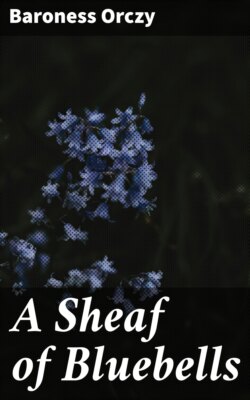Читать книгу A Sheaf of Bluebells - Baroness Orczy - Страница 5
На сайте Литреса книга снята с продажи.
1
ОглавлениеTable of Contents
Among the many petitions presented that year by émigrés desirous of returning to France under the conditional amnesty granted to them by the newly-crowned Emperor, was one signed by Mme. la Marquise de Mortain and by her son Laurent, then aged twenty-one years, and one signed by M. le Comte de Courson for himself and his daughter Fernande. Gaillard says in his memoirs of Fouché that the latter was greatly averse to the petition being granted; but that Napoleon, then on the point of starting for his campaign in Prussia, was inclined to leniency in this matter—leniency which roused the ire and contempt of the Minister of Police—the man who, of a truth, and above the Emperor himself, was virtual dictator of France these days.
“A brood of plotters and intriguers,” he said scornfully. “I should have thought your Majesty had had enough of those soi-disant great ladies and gentlemen of Normandy and Brittany. I wouldn’t have them inside these dominions if I had my way.”
It seems that this phrase: “If I had my way,” highly amused the Emperor. Was it not a well-known fact that in all matters pertaining to the internal organization of the new Empire of France, Fouché ruled far more absolutely than did Napoleon? He knew more. He suspected more. Minister of Police and Minister of the Interior at this time, Fouché had made himself feared even—so it was said—by his imperial and capricious master.
And so—the obscure secretary who was present at this interview tells us—the Emperor laughed, and for once Fouché did not have his way. On the eve of the campaign which was to culminate in the humiliation of Prussia and the Peace of Tilsit, the soldier-Emperor had a throe of compassion, of mercy, a shrugging of the shoulders which meant immunity from exile for hundreds of men and women—a home for countless wanderers in foreign lands.
Fouché argued. “The Fouvielles I don’t mind, nor yet Joubert, nor those Fumels. They won’t do much harm. We might allow the Liancourts to return, though their property has been sold by the State, which always leads to trouble. But the Mortains!!! and the Coursons!!... Why! I would as lief grant the shades of Fox and Pitt a free permit to wander through France at will.”
But we may take it that for once his arguments were of no avail. Napoleon’s clemency was extended to the Mortains, as it was to the Coursons—this we know, seeing that both the young Marquis and the Comte de Courson, his maternal uncle, figured so prominently in the events which this true chronicle sets forth to record. As to the cause of this clemency, or, rather, as to the cause of Fouché not getting his way this once ... well, ’tis our turn to shrug our shoulders.
Had Fouché really desired to keep the Mortains and the Coursons out of France, Fouché would have had his way. Of this there can be no doubt, seeing that Napoleon left the country at the head of his army soon after the day when he had that interview with his Minister of Police, leaving the latter more absolutely master of France than he had ever been before; so why should Fouché not have had his way with the Mortains and with Baudouin de Courson and his daughter Fernande?
Have we not cause for shrugging our shoulders? and for giving credence to the rumours which were current throughout France at this time—namely, that the dreaded Minister of Police had at this time begun to coquet with the Royalist party, as well as with the Jacobins and the English agents, with Talleyrand and with the Comte d’Artois—with any and every party in fact, who plotted against the master whom in his heart he had already betrayed.
